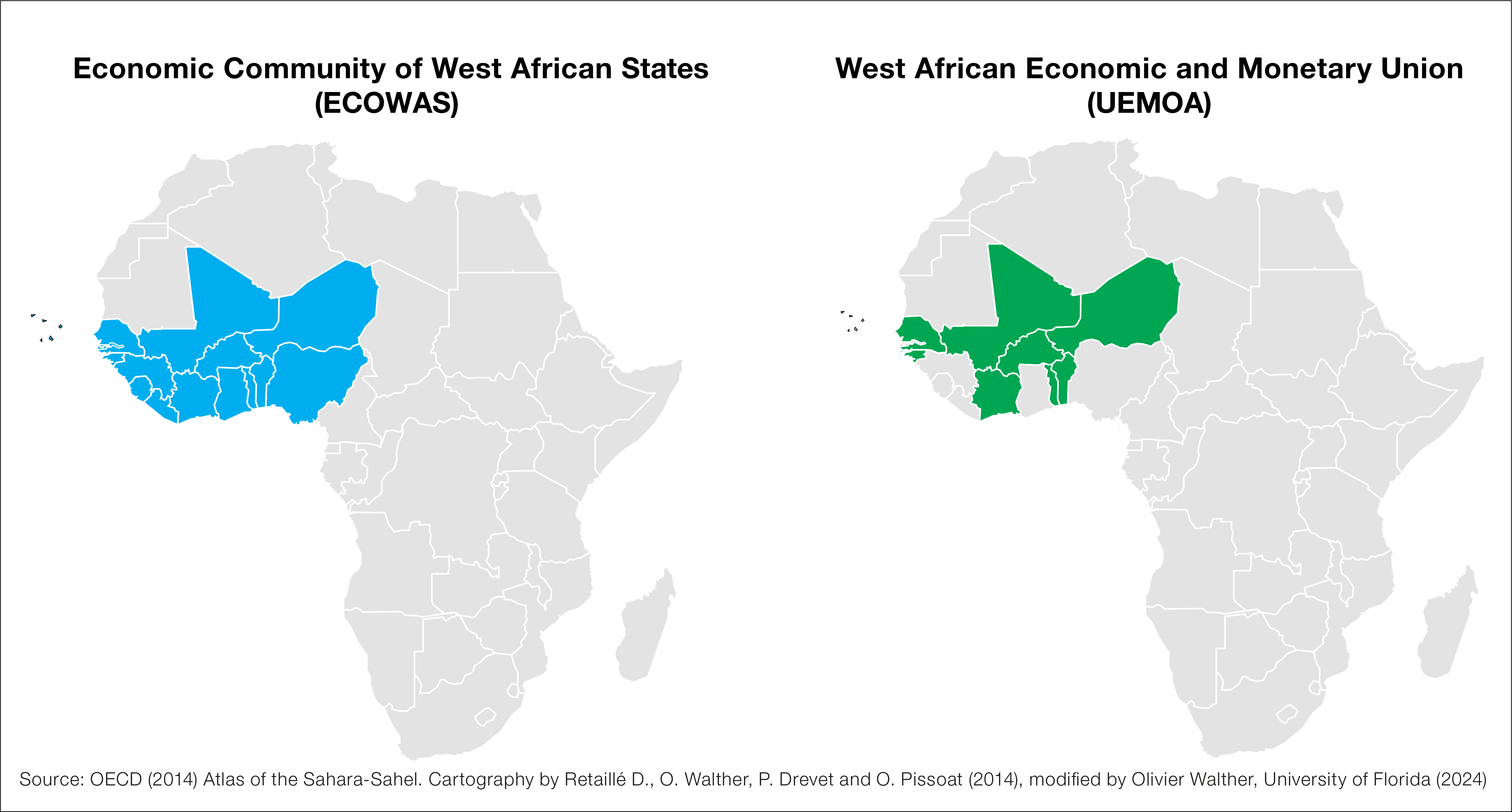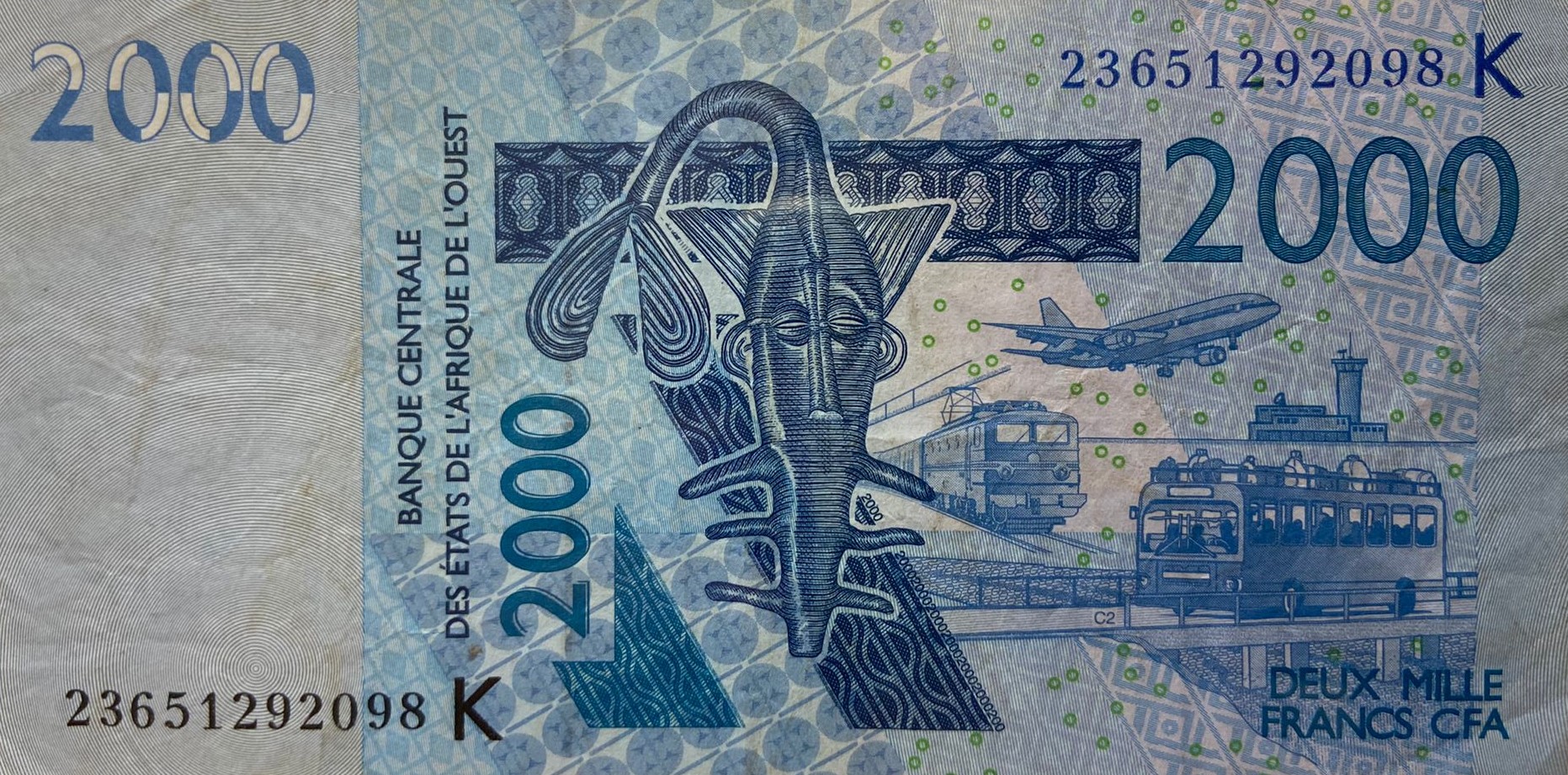By Olivier Walther and Daniel Bach, 02/09/2024
The military juntas who broke away from the Economic Community of West African States (ECOWAS) on January 28th have simultaneously reiterated plans to establish their Alliance des États du Sahel (AES). They are also indicating that they wish to remain members of the West African Economic and Monetary Union that celebrated its 30th anniversary this year.
Known by its French acronym UEMOA, the customs and monetary union has its secretariat in Ouagadougou and remains to this day the most deeply integrated entity in the region. It brings together eight countries, all of them francophone but for Guinea-Bissau, who share a common and convertible currency, the CFA franc, inherited from the colonial period.
Map 1. ECOWAS and UEMOA

These announcements are a reminder of the plurality of the ‘languages’ of regionalism in West Africa as in the broader world of regions. In accordance with their treaties, ECOWAS and UEMOA are both pursuing the same goal of promoting regional economic and financial integration through the free movement of people, goods, and capital.
On a continent where the fragmentation of markets is often a major source of revenue for state elites and their clients, both regional blocs have been confronted with frustrations and disappointing outcomes. Yet, ECOWAS and UEMOA are very different beasts when it comes to their geopolitical approaches to the region.
ECOWAS’s security and governance agenda
In the late 1990s, after a decade of bloody civil wars in the Gulf of Guinea, ECOWAS adopted a vigorous approach to regional security that promotes democracy, and authorizes sanctions and external interventions under certain conditions.
As we wrote elsewhere, the threat of these security and governance protocols, rather than trade liberalization, explains why the juntas of the Sahel have decided to leave ECOWAS in the first place. Their related decision to form a new grouping, the AES, is similarly guided by expectations that a new and informal club, with the support of new international partners, will focus on the consolidation of their regimes.
UEMOA’s macro-economic focus
By contrast, UEMOA has remained less concerned with the imposition of a regional security model than with macro-economic policies and tariff barrier elimination. It is a truly integrated entity, characterized by delegations of sovereignty that would trigger a complex process of negotiation if the three Sahelian countries were to opt out. Created after the devaluation of the CFA franc in 1994, UEMOA is heavily modeled on the European Union, which inspired the prescription of strict macro-economic convergence.
This is of course explained by the fact that UEMOA is a monetary union, whose currency has long been backed by the French Treasury and pegged to the euro. Countries that belong to a monetary union should meet certain development criteria if they want to ensure the stability of their currency.
Over the years, being part of the CFA franc monetary union has been recognized as a factor of economic stability for francophone countries in West Africa. While the FCFA is regularly accused of slowing down economic growth in the region, francophone countries have less suffered from inflation than their neighbors. In Ghana, for example, inflation rates have sky-rocketed recently due to a weak currency, fueling one of the worst economic crises of the last decades.
The risks of breaking with UEMOA
Politically, belonging to the franc zone also represents an incomparable attraction for the new military elites and their external supporters, thanks to the convertibility of the currency. To leave the franc zone would be cutting off one’s nose to spite one’s face.
Perhaps the military juntas also remember Malian president Modibo Keïta and his painful experience of building monetary sovereignty without a strong economy in the 1960s. Faced with enormous difficulties, Mali appealed to France and returned to the FCFA zone in 1984.
If the Sahelian juntas really wanted to break with the past and move towards Pan-Africanism, as they claim, leaving UEMOA and its colonial heritage could be symbolically stronger than leaving ECOWAS. However, it would have even more catastrophic consequences for the region. Their patriotism is unlikely to go that far. By precipitating the collapse of their economies, they would lose what little stability remains in the region.
